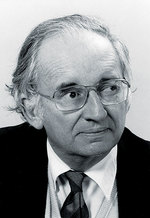Andrew McCredie (1930-2006)
 Obituary Obituary
The death of Andrew McCredie, unexpected by most of us, and taking place following surgery in Melbourne, brings symbolically to a close a particular phase of Musicology in Australia. He was altogether a colourful and eccentric personality and possessed a brilliant mind and remarkable skills in musical research. He was always the centre of his own world and during the decades in which he served the University of Adelaide (which was the greater part of his career) he gave Adelaide extraordinary access to musicological studies of all kinds. There is no denying Andrew's swift impact. With David Galliver now as Elder Professor, he gained a Senior Lectureship, and advanced quite quickly through the ranks to a personal chair in Musicology which he held from 1978 to 1994, and a school of PhD students came into being, many of whom have attained distinction both in Australia and many parts of the world. Among his accolades was the English Royal Music Association's Dent Medal and an Order of Australia (AM) for his services to Music in 1984. He had not been in Adelaide long before he organised the first of several musicological conferences. Andrew was born in Sydney where his first studies took place, and these continued in Copenhagen and Stockholm and with a PhD in Hamburg on German Baroque Opera. This explains why the first conference he organised in Adelaide was on Scandinavian music. There were several more conferences attracting scholars from a worldwide field in which his eminence was growing. From the start he gave attention to Australian music and much later entered the new field of local history by editing a collection of articles on music in South Australia under the title: From Colonel Light into the Footlights (1988). The journal Miscellanea Musicologica was his at its inception. Andrew's world view of music clearly favoured German and Central European music, both in taste and teaching, though historical musicology was gradually losing its place as the unquestioned epicentre of musical studies. There were so many subjects which he took as his own. Graham Abbott's bibliography in the Festschrift: All kinds of Music (ed. Graham Strahle and David Swale), shows how vast his productions were. But a central place might be given to his work on Karl Amadeus Hartmann. Hartmann was a significant symphonist who had studied with Webern and was in conflict with the Third Reich. Andrew produced a detailed catalogue of his compositions as well as a number of articles employing new material, using his influence with German musicians and organisers to obtain performances of Hartmann's works in various places. The thoroughness of his approach was characteristic. Andrew was not everyone's favourite academic, but he was not a man to be overlooked. Various people will make different assessments, but the part he played in a great age of discovering and reassembling and teaching the relics of a great musical heritage was not without honour for the University of Adelaide. Contributed by David Swale
|





